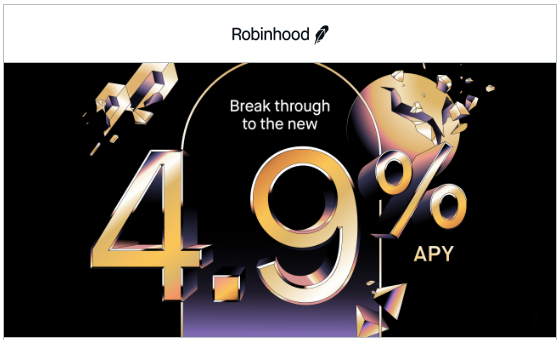In a bold move, Robinhood, the popular commission-free trading platform, has announced a significant enhancement to its offering - a whopping 4.9% Annual Percentage Yield (APY) on uninvested cash. This development comes on the heels of the Federal Reserve's rate hikes, with Robinhood passing on the benefits to its users. In this comprehensive news post, we will delve into the details of this exciting update, its implications for investors, and what it means for the competitive landscape of online brokerage services.
Unpacking the Announcement
Robinhood users recently received an email notification heralding this financial innovation. The message highlighted that this boost in APY is the highest ever offered by the platform, positioning it as a strong contender in the increasingly competitive realm of fintech. The email stated, "It may be hard to believe, but the Fed has raised the rate yet again and we’re passing the upside on to you. Now is the time to take advantage of our highest rate ever. Start earning 4.9% APY on uninvested cash, FDIC-insured up to $2 million at partner banks."

Interest Rate Soars to 4.9%
The standout feature of this announcement is undoubtedly the 4.9% APY on uninvested cash. This is a significant increase compared to the meager interest rates offered by traditional savings accounts and even many other brokerage platforms. The move was prompted by the Federal Reserve's decision to raise interest rates, and Robinhood is wasting no time in passing on these benefits to its customers.
FDIC Insurance for Peace of Mind
One of the key factors that make this offer enticing is the FDIC insurance coverage. Robinhood assures users that their uninvested cash is protected up to $2 million at partner banks. This level of insurance provides a strong safety net for investors, eliminating concerns about losing their hard-earned money in case of unforeseen circumstances.
No Minimum Balance and Low Subscription Fee
Robinhood's offer is inclusive, as there is no minimum balance required to start earning the impressive 4.9% APY. Additionally, users can enjoy their first 30 days free of charge, allowing them to experience the benefits before committing. After the initial period, the subscription fee is set at a reasonable $5 per month. This cost is minimal compared to the potential gains from the high APY, making it an attractive proposition for investors of all sizes.
Flexibility and Accessibility
Another noteworthy aspect of Robinhood's offering is the flexibility it provides. Users can cancel their subscription at any time without being locked into a long-term commitment. Furthermore, accessing their money is hassle-free, ensuring that users can withdraw or invest their funds as needed.
Implications for Investors
The introduction of a 4.9% APY on uninvested cash by Robinhood has several implications for investors, both experienced and novice:
- Competitive Edge: Robinhood's move catapults it into the limelight, challenging traditional banks and other online brokerage platforms. This competitive edge could attract a significant influx of new users, further solidifying its position in the fintech industry.
- Enhanced Earnings: Investors can now earn a substantially higher return on their uninvested cash compared to traditional savings accounts. This extra income can be especially beneficial for those who prefer to keep some funds readily available for trading opportunities or emergencies.
- Risk Mitigation: The FDIC insurance coverage adds an extra layer of security for users' funds, alleviating concerns about potential losses.
- Affordability: The low subscription fee of $5 per month makes this offering accessible to a wide range of investors, regardless of their portfolio size.
- Flexibility: Robinhood's flexibility in terms of subscription cancellation and fund accessibility ensures that users have full control over their finances.
Competitive Landscape
Robinhood's aggressive move to offer 4.9% APY on uninvested cash puts pressure on other online brokerage platforms and traditional banks to up their game. Fintech companies are constantly pushing the boundaries of what's possible in the financial industry, and Robinhood's latest offering is a prime example of this trend.
Traditional Banks: Traditional banks have long been criticized for offering paltry interest rates on savings accounts. With Robinhood's competitive 4.9% APY, they will face increasing pressure to provide better returns to their customers or risk losing them to innovative fintech platforms.
Other Online Brokerages: Competing online brokerage platforms will need to evaluate their own offerings and potentially revise their interest rates to remain competitive. Robinhood's move may spark a race among these platforms to offer higher APYs, benefiting investors across the board.
Wealth Management Firms: Wealth management firms, which typically cater to high-net-worth individuals, may also feel the impact of Robinhood's new offering. As more investors seek competitive returns on their cash holdings, these firms may need to reassess their fee structures and investment options.
Conclusion
Robinhood's introduction of a 4.9% APY on uninvested cash is a game changer in the world of online brokerage and fintech. With its attractive interest rate, FDIC insurance, and low subscription fee, it has positioned itself as a formidable player in the industry. This move not only benefits Robinhood users but also sets a new standard for other financial institutions to follow.
As the fintech landscape continues to evolve, it's clear that customer-centric innovation will be a driving force. Robinhood's commitment to providing its users with better financial opportunities is a testament to this ethos, and it will be fascinating to see how other players respond to this challenge. In the end, the biggest winners are the investors who stand to earn more than ever before on their uninvested cash.



